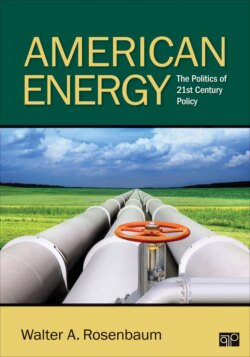Читать книгу American Energy - Walter A. Rosenbaum - Страница 11
На сайте Литреса книга снята с продажи.
Federalism With Raw Edges
ОглавлениеThe Deepwater catastrophe from its inception was also a crisis of governance. Federal, state, and local governments are deeply implicated legally, economically, and politically in the production of every major source of American energy, and especially in the regulation of fossil fuel from exploration to consumption. Governmental collaboration in domestic energy management, while never ensured, has usually been cooperative. Here was an unprecedented regulatory disaster requiring an immediate federalized response—incisive, coordinated, and technologically sophisticated. Unfortunately, the Gulf explosion demonstrated that intergovernmental energy collaboration isn’t ensured.
Since the Deepwater disaster was a federalized emergency, it quickly mobilized multiple governmental stakeholders. The peak of the response involved more than 45,000 individuals drawn from federal, state, local, and regional governmental agencies. What followed were weeks of difficult and often highly contentious efforts by the federal government to coordinate the rapidly multiplying array of other governmental stakeholders determined to protect their own interests.
The National Contingency Plan (NCP) existed to coordinate federal, state, and local governmental responses to such disasters. The governmental responses to the explosion, however, quickly degenerated into a persistent conflict between federal, state, local, and private interests about their respective roles and responsibilities as each attempted to intervene in some manner to stifle the oil leakage and to minimize their own anticipated risks from the impending environmental and economic damage.
The disaster plan called for the federal government, led by the US Coast Guard, to assume primary responsibility for controlling the spill and coordinating other governmental agency support. Other federal agencies quickly responding included the Department of the Interior, the Department of Homeland Security, the National Oceanographic and Atmospheric Administration, and the Department of Energy.
All the state and local governments within the Gulf, especially those closest to the spill from Louisiana, Texas, Mississippi, and Alabama, were aggressively involved and immediately dissatisfied with the federal response and soon created a “considerable confusion, delay and controversy that still prevails.”4 The contention early reached a level that persuaded the Coast Guard’s Admiral Thad Allen, the very experienced and capable response Director, to warn his staff about the onrushing problems. “This isn’t a sprint, or even a marathon,” he cautioned, “this is a siege.”5 A final report on the Deepwater event noted the confusion:
During this spill … the Governors and other state political officials participated in the response in unprecedented ways, taking decisions out of the hands of career oil-spill responders. … Because the majority of the oil would come ashore in Louisiana, these issues of control mattered most there. Louisiana declined to empower the officials that it sent to work with federal responders within Unified Command, instead requiring most decisions to go through the Governor’s office.6
During the more than two months required to cap the stubborn oil leak, the local governments surrounding the Gulf also created their own, improvised responses to the spill without regard to whatever might have been prescribed by the National Contingency Plan. Louisiana’s county governments (called “parishes”), for instance, attempted to assume as much independence in controlling the leaked petroleum as the state had asserted. Many parishes purchased their own equipment and created their own disaster management organization. Numerous private organizations, as well, rushed to share in disaster management often without regard for the managers and strategy of the National Contingency Plan.
